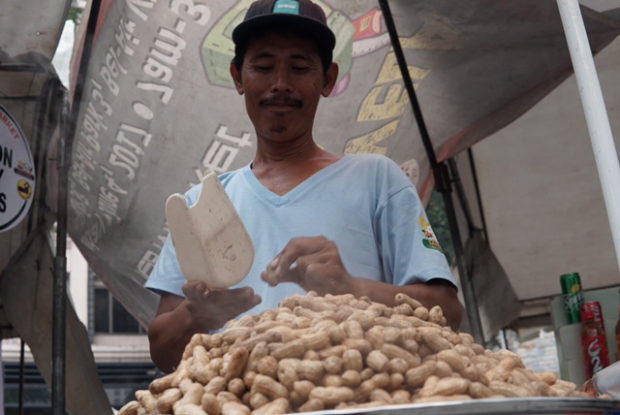Working for peanuts, earning high praise

EYE-CATCHER Amid the gourmet offerings at Salcedo Community Market, Louie Bagunas’ peanut stall stands out, attracting regular buyers. —AIE BALAGTAS SEE
Because he literally works for peanuts, street vendor Louie Bagunas has to make do.
Success in his trade, the 44-year-old found out, begins with a two- to three-hour walk to Salcedo park, at the heart of Makati City’s central business district, where his cart of boiled peanuts jostles for space every Saturday with the gourmet offerings and pricey delicacies.
For the past 10 years, Bagunas starts out at 4 a.m. from his house in Pateros, and pushes his cart for 8 kilometers to the upscale weekend market, where he arrives promptly at 7 a.m.
Once the market closes at 2 p.m., Bagunas treads the same path home — rain or shine — content with the thought that at least he had saved fare money that could be better spent paying bills.
“Besides, no one wanted to give me a ride, not with these sacks and cart in tow,” said Bagunas, a father of three.
His weekend route eventually became his version of the long walk to freedom — from want, from hunger and from worries about his children’s future.
Saving his meager earnings has enabled him to send his three children to a semiprivate school and buy a two-story house for his family, Bagunas said.
His humble trade also earned him the respect and trust of Salcedo Community Market regulars — businessmen, celebrities, politicians and foreign tourists who craved boiled peanuts but were hesitant to buy from street peddlers whose goods could be laced with the effluents and dust of polluted Metro Manila.
Trustworthy
Bagunas’ list of “suki” (regular buyers) include Josefina Elicaño, president and chief operating officer of Empower Moreishi, who describes the peanut vendor as trustworthy.
“You get the impression that his goods are clean and hygienic. He’s also fair and honest and does not cheat his customers. He gives you your money’s worth,” Elicaño told the Inquirer in an interview.
Success did not come easy for Bagunas who aspired to become a seafarer, but had to drop out after second year college because of poverty.
Surviving without a college degree meant working odd jobs —as mechanic, construction worker, or whatever vacant post there was to fill. He worked for at least 20 companies in his younger days but couldn’t find one that would hire him as a regular employee.
“It’s cheaper for these companies to implement ‘endo’ than to regularize employees,” he said, referring to the practice that allows employers to terminate their workers’ contract before they become eligible for the benefits due them after six months on the job.
“Endo” was not much of a problem for him when he was younger, Bagunas said, because he always found a job. But turning 30 changed all that.
He was no longer fighting just endo, but also the age cap that companies usually enforce to make sure that only young and able-bodied employees work for them.
“A woman in one of the manpower agencies told me: ‘You’re 30. You’re too old. Sorry, but we can no longer hire you,’” he was told in a job interview.
A desperate Bagunas, who was raising his first child at that time, shot back: “Why? Does being 30 years old mean I no longer have to eat?”
Determined to feed his son and win the war against endo and the age cap, Bagunas looked for other jobs. A friend suggested that he try peddling boiled peanuts on the street. Left with no choice, he agreed.
Dirty, unsanitary
The problem was, most people consider street food dirty and unsanitary, he said.
“Car owners rarely rolled down their windows to buy from me,” Bagunas said, adding that other peanut vendors encountered the same problem. Oftentimes, only truck and jeepney drivers would stop to buy his goods.
Things turned for the better when he met a man selling cotton candy who told him about the Salcedo Community Market. The owners were nice, he was told; maybe they could give him some space.
They did, with the Salcedo Community Market organizer allowing him to ply his trade for P330 every Saturday.
And so his wooden cart found a place in the classy nook ringed by posh condominiums and high-end establishments.
Bagunas’ hard work did not go unnoticed. Last year, a Facebook post about him went viral and caught the attention of a taxi driver from Pateros, who reached out to him through social media and offered him a weekly ride for P200.
Bagunas immediately said yes. The fare was much cheaper than what most taxi drivers would charge. Riding a cab also meant that he had given himself an upgrade from the tedious walk that he had resigned himself to.
“Kahit papaano siguro, masasabi ko na umasenso ako (Somehow, I could say I’ve made it),” he said.
And to his surprise, his cart and sacks fit perfectly in the cab.














